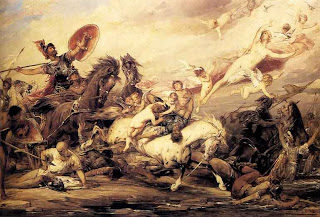Immortality-
Being able to live forever. Isn't that the wish of humans of the past and the present. A state where you cannot die.
 Sounds amazing right...
Sounds amazing right...You live while others die around you.
You suffer from an incurable disease which incapacitates you, but cannot kill you.
In times of need, you cannot die from starvation or dehydration.
You are dismembered and torn to pieces, still you cannot die.
The universe has ended and still you cannot die.
But, lets also look at the bright side...
You get to keep your riches.
You can do anything that you want.
You have all the time in the world.
In our reality, immortality is only present in the form of biological immortality. Hydras, bacteria, water bears and Turritopsis nutricula are the only living organisms capable of biological immortality. Turritopsis nutricula are jellyfish capable of reverting into a previous state, such as being a polyp, and start the aging process all over again.
In mythology, all gods, goddesses and spirits are considered immortal. But that does necessarily mean that they are incapable of being hurt or killed. It just means that they cannot die under normal circumstances.
For example, Greek gods and goddesses must maintain a steady diet of nectar and ambrosia in order to keep their youth and immortality. Norse gods and goddesses have the golden apples of the goddess Idun in order to maintain their youth and age. The Greeks also mention their own version of golden apples, which is kept at the Garden of the Hesperides, guarded by the dragon Ladon and tended by the daughters of Atlas, which also possess the same abilities. In the epic of Gilgamesh, the king of Uruk, Gilgamesh, goes on a quest to become immortal after the death of his friend, Enkidu, by finding the immortal hermit, Utnapishtim, to obtain its secret. Utnapishtim gives him an herb which restores his youth, but loses the herb to a snake, which can now shed its skin to regain its lost youth. There is also the famous Elixir of Life, made from the Philospher's Stone, created through alchemical means.
Being immortal does not mean that you cannot get injured in any way. Take Greek Mythology for instance.
There have only been two mortals known to have injured an immortal: Heracles and Diomedes. Heracles has hurt Hera and Hades, while Diomedes has injured Aphrodite and Ares. The differences between the two of them is that Heracles is a demigod (part-god, part-mortal), while Diomedes is a full mortal favored by Athena. Heracles wounded the immortals at different times, while Diomedes wounded his on the same day on the Trojan War, while being given divine sight and chariot assistance, as well as divine accuracy by Athena. In the Norse myths, a majority of the Norse Gods and Goddesses die on Ragnarok. The Shinto Goddess Izanami no Mikoto was also killed when she gave birth to the god of fire, Kagu-Tsuchi. Osiris was killed by his brother Set.
Invulnerability is different from immortality. One of the ways provided by mythology to become invulnerable is to bathe in the River Styx, the reason why Achilles is invulnerable, except for his heel tendon. The Norse hero, Sigurd, bathed in the blood of the dragon, Fafnir, which made him invulnerable except for a spot on his shoulders.
Immortality has its place in the desires of man and the creative minds of literary artists. Whether it be science or myth, living forever is a deal worth fighting for





0 (mga) komento:
Mag-post ng isang Komento